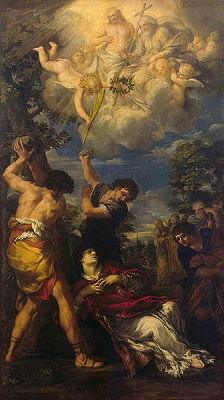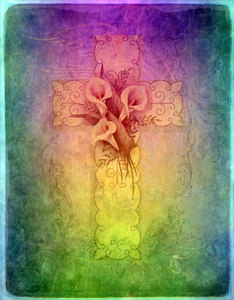
The Egyptian Church is the Target
Regular Attacks Continue on Egyptian Churches
Todd Daniels, Regional Manager for the Middle East with ICC's Egypt Representative
Washington, D.C.
December 14, 2013
An increasingly vulnerable Egyptian Church continues to serve as a convenient target for pro-Morsi supporters to vent their rage as tensions in the country show no sign of abating following the Muslim Brotherhood's removal from power in July. Islamist crowds coalesce weekly in front of one of the major churches in the Cairo suburbs following Friday prayers, leaving behind scrawls of anti-Christian graffiti, vandalism, and threats of violence.
Even more worrisome, however, is the continuation of shooting attacks carried out by gunmen on motorcycles. For the Christian community in the greater Cairo area, these assaults are a painful reminder of the devastating October terrorist attack on a wedding service at the Church of St. Mary and St. Michael in a suburb of Cairo in which five were killed and nearly twenty were wounded.
St. Mary's Church, located in al Zeitoun, a northern suburb of Cairo about 30 km from the scene of the October shooting, has served as the focal point for the anger of pro-Morsi supporters in the area. In a scene which has now been repeated for six consecutive Fridays, worshippers emerge from the nearby Aziz Bellah Mosque and descend on the church, spray-painting curses and threats like "Here is the place of pigs and slaves," "This is the church of whores," and "Egypt is an Islamic country, and will be soon." Moreover, on November 22, following an attack in which gunmen opened fire on the church, some Christian youth chose to attempt to prevent the vandalism and were attacked as government security forces looked on.
Fady Ramzy, a member of St. Mary's, told International Christian Concern (ICC), "Every Friday after their departure from the front of the Church we have to paint all the walls of the church to erase their phrases, and that takes a great effort from all of us." He went on to describe the danger they face in trying to protect themselves. "Some of us have been injured during our intervention to prevent them from vandalizing our Church. How long will we suffer from these attacks on our Churches?"
An attack on November 19 in Kafr, west of Cairo, seems to be a continuation of an increasing number of motorcycle attacks. Two Islamist gunmen on a motorcycle opened fire on the Church of St. Abu Abu Seifein. The shooters wounded two of the security forces. Fr. Kerolos, the priest of St. Abu Abu Seifein, told ICC, "I was at my home when the church was shot at. The Christian guard who was staying inside the Church called me and told me that two gunmen on a motorcycle shot at the main door of the Church and at the security forces who were guarding the Church and then fled." Arrested the following day, the attackers were revealed to be members of the Muslim Brotherhood, who have come to see the Egyptian Church as the main reason for their removal from power.
An attack in late October at St. Mary Ardel Sherka Church in the suburbs north of Cairo is an example of what the Egpytian Christian community considers to be an increasing boldness on the part of those who are seeking to intimidate them. Two Muslim men on a motorcycle attacked and robbed a Christian journalist named Hanan Fekry in the front the church. As she was pleading for help from passers-by, one of the attackers pointed a pistol at her face before fleeing.
"These attacks against Christians and kidnappings aren't something new in Egypt, these were taking place in the past also, in the days of Mubarak and before that," Tony Sabry, spokesman for the Maspero Youth Union told ICC. "But the attacks against Christians and kidnappings have increased since the 2011 Revolution, even more during the days of Morsi, and especially now after the ousting of Morsi," Sabry continued.
The inability or the unwillingness of the Egyptian security forces to protect the Christian community from these attacks is disturbing. Some activists believe that the attacks are part of an intentional plan targeting the Church and questioning the legitimacy of the current government.
Romany Michelle, a Christian activist, told ICC of plans to attack churches and maps designating churches as targets that have been seized by the government during raids on terrorist elements in the Sinai and Gaza areas. "The motive of this scheme," Michelle told ICC, "is to put the current government in a critical situation and prove its failure in protecting the Copts and their houses of worship in front of the international community." This plan targets the Christians as collateral damage as these Islamist groups attempt to wrestle back political power from the military and more secular Egyptian leaders.
The negotiation process to establish a new, more inclusive political order that protects the rights of its citizens is seeing some success, though there is a long road ahead. In the meantime, the country's leaders must ensure, as a first priority, the physical protection of its citizens, especially the Christian community.
For interviews, contact Todd Daniels, Regional Manager for the Middle East: [email protected]
# # #
You are free to disseminate this news story. We request that you reference ICC (International Christian Concern) and include our web address, www.persecution.org. ICC is a Washington, D.C.-based human rights organization that exists to help persecuted Christians worldwide. ICC provides Awareness, Advocacy, and Assistance to the worldwide persecuted Church. For additional information or for an interview, contact ICC at 800-422-5441.
International Christian Concern
2020 Pennsylvania Ave. NW #241
Washington, D.C. 20006
www.persecution.org | E-mail: [email protected]


 RSS Feed
RSS Feed